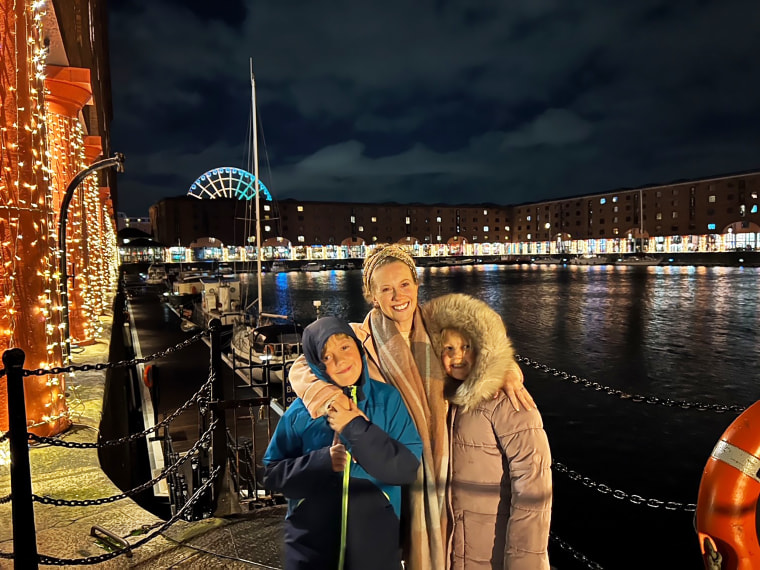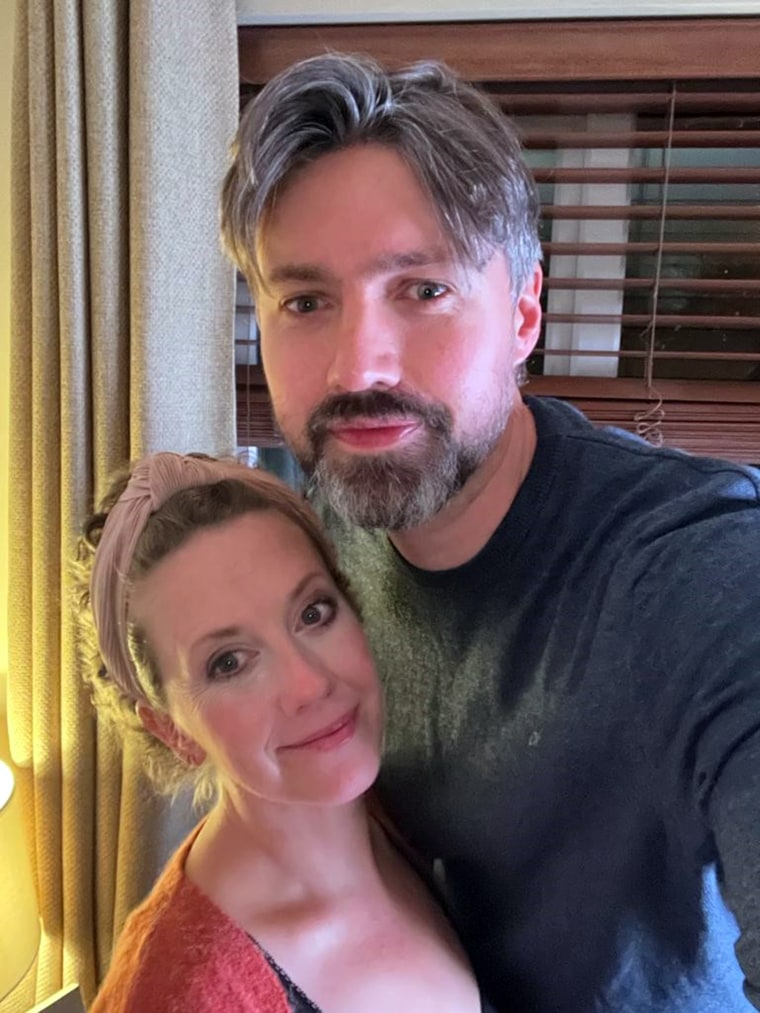In 2016, two years after the birth of her daughter, Kelly Pendry experienced pain and heavy bleeding during periods. She asked her doctor it and felt reassured — at first.
“I had been told your body can actually take up to three years to sort itself out after pregnancy,” the 42-year-old from North Wales in the United Kingdom tells TODAY.com. “I kept thinking to myself, ‘It will improve. It will improve.’ And then it just didn’t.”

For years, her periods worsened, and doctors thought she had fibroids. In 2021, further testing revealed she had stage 4 uterine leiomyosarcoma, a rare cancer of the smooth muscles in the uterus.
“I saw a junior doctor… (who) didn’t even tell me I had cancer at first. It was a word they just seemed to refuse to use,” she says. “It was me who had to say, ‘Do I have cancer?’ and he said, ‘Oh yes, you do.’”
Heavy bleeding with periods, pain
By 2018, two years after her symptoms had started, Pendry felt even worse.
“My periods themselves were actually quite debilitating, and they were changing the course of my life. They were making family days out difficult. They were making socializing difficult, school runs, things that you almost take for granted,” she says. “I would be doubled over in agony.”
The bleeding became disruptive. One day, she was going to her child's school, no more than a 10-minute walk from her house.
“Despite changing my pad before I went to the school, by the time I’d gotten back, I had blood trickling down my legs so much it ruined my socks and my shoes," she recalls.
Pendry visited her doctor, who suggested that she upgrade her birth control and try an intrauterine device or a contraceptive implant. When she returned to the doctor because the bleeding increased, her doctor offered her a different solution: antidepressants.
“My life was really debilitating, and I (wasn't) being the mum that I wanted to be to my kids and ... wife I wanted to be to my husband," she says. "I did have quite the low mood."
Her physical symptoms were playing a role in her emotions, she adds: "At that point in time, I was probably bleeding two and a half to three weeks of the month. ... Had we been able to maybe look at the physical symptoms, then the mental symptoms perhaps wouldn’t have been there at all."
In 2019, her doctor recommended she see a specialist to better understand what was occurring. But her case wasn’t considered urgent, and she experienced many canceled appointments. Eventually, she got an appointment in March 2020.
“(The doctor) said to me, ‘I’m not happy with this at all. You need to be referred urgently,’” Pendry recalls. “He did put me on that absolute urgent pathway.”
Next, she met with a gynecologist, who believed Pendry had uterine fibroids, tumors that develop in the uterus that aren't cancerous and don't increase cancer risk, per Johns Hopkins Medicine.
“I was also told that perhaps I was making more of my symptoms than they’re actually worth because benign fibroids were very, very common. … They’re nothing to worry about,” she says. “They don’t go cancerous apparently.”
Then coronavirus lockdown started, and Pendry didn’t see a doctor until December 2020. When she did, they offered her a laparoscopic hysterectomy — a minimally invasive procedure where the uterus is removed through a few small incisions — and a choice between two procedures for her uterine masses: morcellation, where the fibroids are cut up to facilitate their removal, or injections to shrink them.
In her personal research, Pendry found that morcellation was “dangerous,” she says, so she opted for the injections and no hysterectomy. She had hoped for a traditional hysterectomy with fibroid removal, but doctors told her it was “outdated," she recalls.
“I was so sick of feeling bad. I was so sick of this bleeding. I was now starting to get dizzy spells and headaches, and I was vomiting,” she says. “None of my concerns were being taken seriously.”
The injections weren't successful, and her symptoms worsened. In August 2021, she underwent an MRI, which she had "pleaded for for almost a year," Pendry says. Shortly after, she learned a mass in her uterus was cancerous.
At first, doctors told her she was a good candidate for surgery. But in September 2021, she learned that was untrue.
“I was faced with this nurse actually saying to me, ‘No, you have a uterine sarcoma. You are terminal. You are stage 4. We won’t be offering you any treatment,’” Pendry recalls. “She actually turned around to my mom and said, ‘I suggest she doesn’t make plans with her children for Christmas.’”
Uterine leiomyosarcoma
Uterine leiomyosarcomas grow in the muscle of the uterus, what’s called the myometrium, according to the American Cancer Society. The organization notes that “uterine sarcomas are rare.” Uterine leiomyosarcomas can be aggressive and fast growing.
“I would say three-fourths of (our members) thought they had a benign fibroid in their uterus, and it turned out to be a leiomyosarcoma,” Sharon Anderson, founder of Leiomyosarcoma Support & Direct Research Foundation, tells TODAY.com. “They went several years sometimes with heavy bleeding and cramping before they got a hysterectomy and then they found out they have LMS.”
Anderson is a 21-year survivor of stage 4 uterine leiomyosarcoma.
“I’m an anomaly,” she says.
In January of 2002, Anderson learned she had uterine leiomyosarcoma after a hysterectomy for what they “thought was a benign uterine fibroid.”
“It went straight to my lungs within a year, and I’ve had surgery and then it went to a lymph node in my chest, and I had surgery again,” she says.

At the time, Anderson could find little information about her cancer, prompting her to start the organization. Later, she had a hunch about her tumor that led to some of her treatment.
“I asked the doctor to test the tumor tissue that they took out for estrogen receptors — just like breast cancer — because I thought, ‘Well if breast cancers are estrogen sensitive, why not a uterus?’” she says. “There was no research about estrogen receptors in leiomyosarcoma. We took out my ovaries and then went on a breast cancer drug, an aromatase inhibitor, which blocks estrogen.”
Since then, Anderson has been tumor-free and has not needed treatments for 17 years. Some doctors test the cancers to see if they have hormone receptors, but because of the rarity of the cancer, it’s not standard practice, she says.
“There’s just not a lot of research,” she adds. “My doctor said, ‘Sure we’ll try it. There’s nothing else for you because it’s not very treatable.’”
Anderson and her group have advocated against the morcellation of fibroids because if they are leiomyosarcoma, it spreads the cancer, she says. The American College of Obstetricians and Gynecologists (ACOG) addressed morcellation in a March 2021 committee opinion:
“Before considering morcellation of the uterus, a woman should be evaluated to determine if she is at increased risk of a malignancy of the uterine corpus. Morcellation of a malignancy is contraindicated.”
The Leiomyosarcoma Support and Direct Research Foundation provides funding to various researchers investigating the cancer. Anderson feels grateful she can help others.
“We get people who’ve never heard of this, and they get the diagnosis and they somehow find our support group and they are just overwhelmed,” she says. “They’re in tears of relief of not only just finding other people but getting some information.”

Life with stage 4 cancer
Right after her diagnosis, Pendry felt as if she “were being sent home to die.”
“I’ve got a 7-year-old and a 9-year-old. I can’t stop looking at them and crying. (I’m) 10 years into a wonderful marriage,” she says. “I sat there thinking this can’t be true.”
Her friends urged her to get a second opinion with a sarcoma specialist. (Anderson also recommends people with uterine leiomyosarcoma see a sarcoma specialist.) The doctor mentioned it was “incurable” but “not entirely untreatable,” Pendry recalls.
In October 2021, she did six rounds of chemotherapy, finishing in February 2022.
“I was assured at that point in time that, if we kept some stability (in the tumor's size), even if we didn’t achieve more shrinkage, we could possibly look at surgery to remove the primary tumor,” she says. But Pendry has still struggled to find someone in the U.K. who will perform it.
She also wants her uterus and ovaries removed with an open incision to cut off the supply of estrogen to her cancer but hasn't been able to schedule this procedure.
Since April of last year, Pendry's taken a hormone inhibitor to stop estrogen production, which has provided some stability and given her time to enjoy life.
“I’ve been able to get on with my life really well,” she says. “I still walk to and from the school run. My husband and I climbed Snowden not too long ago. So, I still lead very much a fit and healthy lifestyle.”
Worrying about her prognosis remains. At times, Pendry wonders if her doctors have misled her about how serious her cancer is and that’s why no one will do surgery. She hopes to go to the United States either to participate in a clinical trial or undergo surgery. Since connecting with Anderson’s nonprofit, Pendry's encountered many people with stage 4 uterine leiomyosarcoma who are “thriving,” all thanks to surgery, Pendry says.
As Pendry and her husband try to raise money for treatment, she updates people on her Facebook page.
“I can bring awareness to this cancer for other women because if it’s caught in its very early stages, there is more of a shot. There are women out there that have survived this from stage 4, and I really want to be one of them,” she says. “I wish there was somebody that wanted to save my life.”